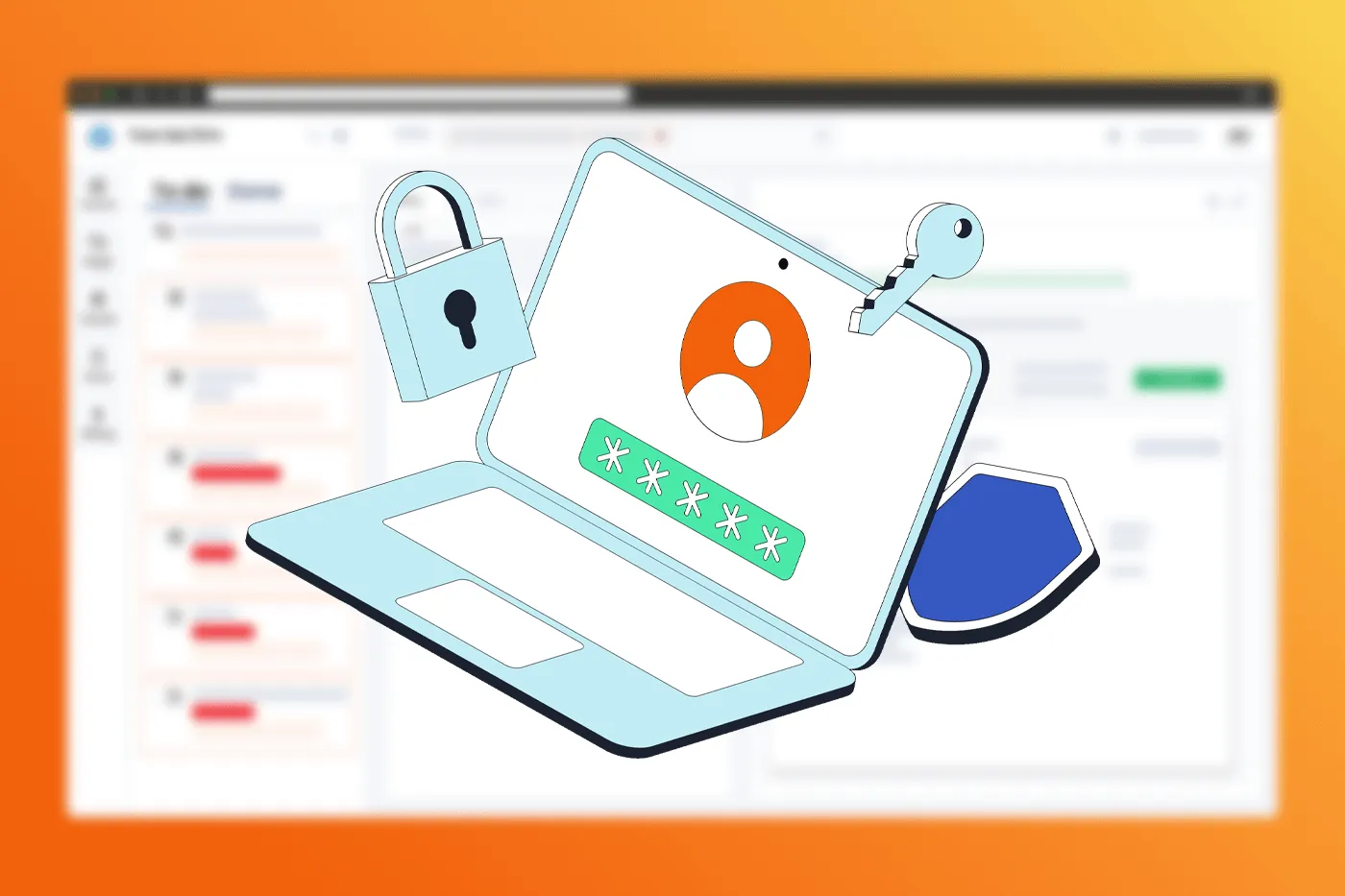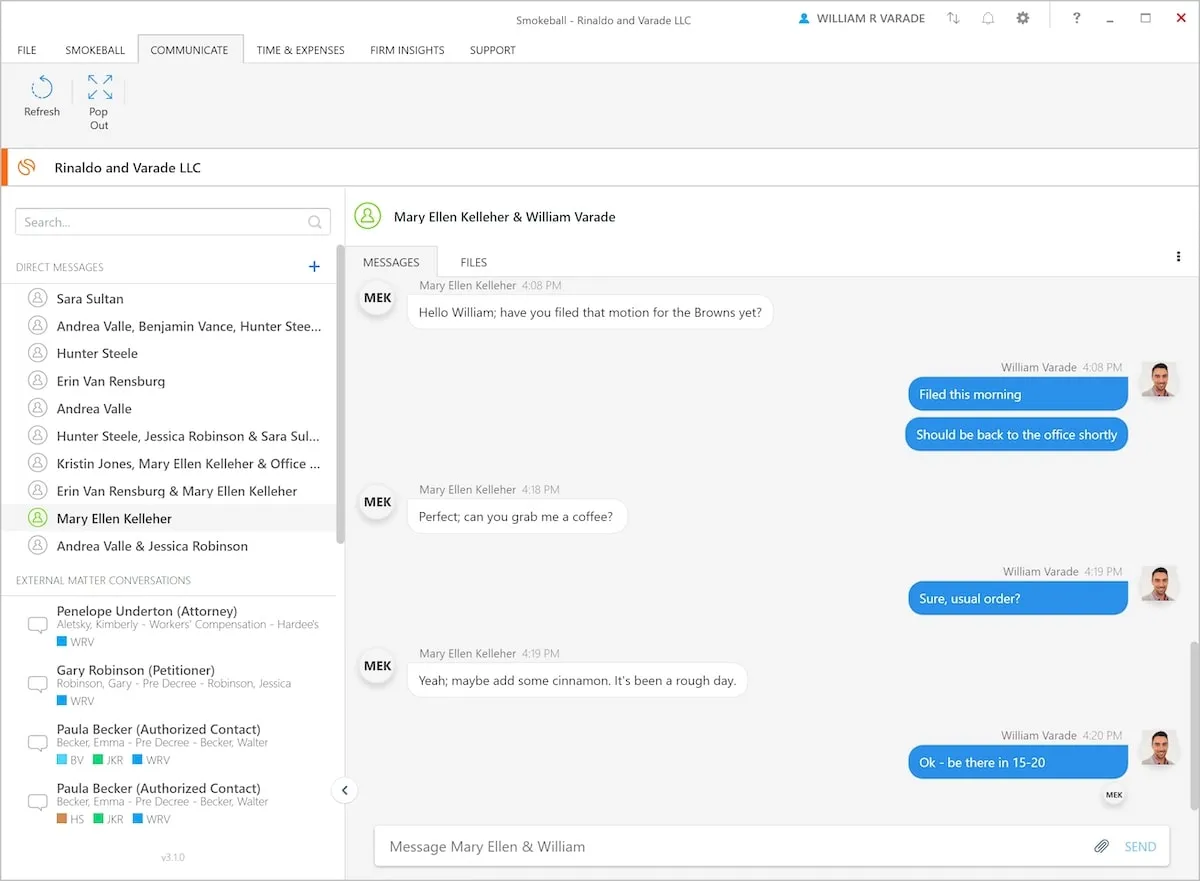Effective and Scalable Law Firm Communication Strategies
Written by
|
September 6, 2023
Written by Smokeball
|
September 6, 2023

Written by Jordan Turk
|
September 6, 2023

Being a legal professional at a growing law firm requires you to hone your communication skills in several ways, each of which is vital to the success of your business. Good communication improves your practice across the board—between attorneys and clients, and internally.
In this post, we’ll discuss some strategies and best practices you can use to improve staff and attorney-client communication at your law firm. These strategies and best practices include:
- Identifying where communications breakdowns occur, so you can implement processes to prevent them
- Utilizing legal software to make communication more accessible and more impactful
- Developing legal workflows that instill effective communication and help you and your colleagues stay on the same page
- Building "soft"—but highly effective—skills around communication so you and your coworkers can do your jobs more successfully
Let’s dive deeper into effective communications for legal professionals.
The Benefits of Communication Skills for Law Firms
Communication skills benefit legal professionals and practices in many different ways, both client-facing and within the firm or with other members of the legal industry.
The benefits of improving client communications
For you and your law firm to succeed, you need a steady and reliable stream of incoming business—and you’ll be much more likely to attract and win new clients if you communicate clearly and proactively from the start.
The better you communicate your firm’s values, message, and goals with potential clients—and the better you listen to their needs and questions—the better you’ll be able to retain clients who are good fits for your firm. This will happen because your communication style and your firm’s mission will resonate strongly with them; as a result, they will enjoy working with you more, and they will want to recommend your services and you personally to others they know.
When your communication clearly represents the work you do, clients essentially select themselves. Some of the specific reasons for this are:
- Potential clients will better understand what your firm does and why you’re a good fit for their needs—which avoids potential mismatches early on
- Potential clients will look at you more favorably than other firms because you’re following up quickly on timely matters
- Potential clients will feel like you understand and care about them from the very start because you’re listening and responding attentively
The benefits of developing communication skills within your practice
Communicating effectively with the lawyers and staff at your firm is necessary for collaboration, which uplevels your firm to new heights of business performance and client service.
While this might seem obvious, “communicating with other members of your firm” could mean something different than you think it means—because communicating across your firm extends far beyond sending emails or having impromptu desk-side chats.
In fact, now that many law firms are moving to hybrid or remote working arrangements, the need for better internal communications across many communication channels is more important than ever.
Some advantages to improving internal law firm communications include:
- Keeping everyone on the same page about what’s happening with prospects, clients, and matters
- Streamlining the way members of your firm input, store, access, update, and organize client information and records—saving time for everybody
- Making it easy for members of your firm to collaborate and ensure continuity of legal service when multiple members of your team are working on the same matter or client relationship
- Sharing valuable techniques, knowledge, and tools that help everyone at your firm win
- Enhancing the way your firm works with and is perceived by other institutions and members of the legal profession in your area—including judges and opposing counsel
3 Best Practices for Law Firm Staff and Client Communications
Now that we’ve covered the benefits of improving communications at your law firm, let’s explore some of the best methods and techniques for effective legal communications.
- Identify breakdowns in the way your firm communicates
Examples of breakdowns across communication channels
As in any area of life, communication breakdowns can cause problems—and you know all too well that miscommunications and missed deadlines are even more problematic during the legal process.
You’re undoubtedly familiar with the litany of potentially negative ramifications of communication breakdowns in your practice:
- Losing potential clients to competitors because you didn’t respond adequately
- Negative client reactions, interactions, and reviews due to clients feeling you’ve misled them, communicated poorly, failed to keep them in the loop, or used a tone or manner of expression they didn’t like
- Lost business and other issues stemming from errors and breakdowns caused by miscommunications between members of your legal team
- Costly time wasted on non-billable tasks due to inefficient communication methods
These are just a few examples; there are many other aspects of legal practice where communication breakdowns can cost you.
So, what should you do about it?
Recognize important touchpoints throughout the client experience
There are likely to be many different touchpoints during a client’s journey or lifecycle with your practice. A touchpoint is any occasion where communication happens (or should happen) between you or a staff member with a prospect or client—so, each touchpoint is an opportunity for communication, and the nature of that communication often determines whether that touchpoint is positive or negative.
Examples of important attorney-client touchpoints during a client’s journey with your firm include:
- The language that greets new prospects when they visit your website
- The advertisements that introduce your firm’s services to your audience
- The software that you use to help potential clients connect with your team
- The initial interactions that you have with prospects—via email, phone, video call, text message, or in person
- All of the communications you have with clients about their case or matter once they sign a retainer
- Communicating with clients when it’s time for them to pay you for your services
- Attaining positive reviews and referrals from clients and maintaining client relationships over time
It’s extremely valuable for you to map out where these touchpoints should happen, understanding how and why breakdowns occur, and problem-solve ways to remedy issues when they arise or prevent them from happening altogether.
- Utilize modern legal software to communicate more effectively
Modern legal clients expect white-glove service, which includes consistent communication practices. So, it’s essential for you to empower prospects and clients to interact with you using their preferred communication methods while maintaining security, confidentiality, and compliance.
You want to make things as easy as possible so that, no matter what they’re dealing with in their lives, dealing with your firm is a positive experience, keeping them loyal. And using legal software like Smokeball is one of the most powerful ways for you to meet the high levels of expectation held by modern legal clients.
Make client communications secure and simple with legal software and client portals
Today, there are so many different communication tools at your fingertips that didn’t exist in the past—such as email, text, Zoom, and secure client portals like the one offered by Smokeball. These tools allow you to connect with prospects, clients, and other members of your firm no matter where you’re located, in whatever form is most convenient.
For prospects and clients, this is particularly meaningful because it allows them to feel looped-in to the legal process without them having to show up at your office except when it’s necessary.
Improve legal client intake and marketing with software tools
During the new client marketing and intake processes, legal lead management and client intake software can help your firm simplify the process of vetting, nurturing, and converting potential clients into paying clients.
Legal client intake software like Smokeball’s LeadPro offers powerful communication features such as:
- Integrations with virtual assistants, video conferencing platforms, and email and calendar providers such as Google and Microsoft
- Custom templates for email creation and scheduling that enable you to set up messaging campaigns and reminders that go out to potential clients automatically
- Online legal client intake forms that gather information automatically from potential clients, saving you and the prospects the hassle of back-and-forth emails or in-person meetings to discuss details that they can easily input into online forms
- Customer Relationship Management (CRM), a software tool that organizes all of your contacts into one easy-to-access database that makes follow-ups and conflict checks a breeze
- Document sharing and signing, which allows you to rapidly generate and send documents to prospects to complete—without them needing to fax, print, or mail anything
Altogether, these tools enable all of your communications with a potential client to live in the same place, creating a client-friendly experience right from the start.
Enhance law firm communication throughout the matter intake and management process
Once a client signs a retainer, the matter intake and management processes begin—and legal case management software (or legal practice management software) takes the wheel.
Legal practice management software, like Smokeball, automatically and seamlessly transfers all the information gathered during the lead intake process into Smokeball’s MatterFlow, or matter intake. This transition process is a crucial part of a legal workflow to jump-start matter management.
The right software should make communication throughout matter intake and management simple by:
- Making it easy to assign tasks to different firm members, so there’s never confusion about who is handling what
- Keeping clients and firm members informed of deadlines and important dates with one-off, templated, or automated messages—so nothing gets missed
- Providing text-message-like communication through a secure and encrypted client portal
- Enabling billing and payment transparency when time-tracking software automatically populates and itemizes invoices so that clients aren’t confused about their bills
- Increasing on-time payments and revenue realized with automated messages that provide payment options and reminders
- Enhancing firm-wide collaboration with legal calendaring, tasks, and workflows that everyone at the firm can follow and access from anywhere, on any device
- Create a better communication culture at your law firm
In addition to implementing legal software to help you get and stay on track—and in conjunction with the effects that legal software can have on the ways in which members of your firm interact—another best practice for effective law firm communication is to foster a culture of communication within your legal practice.
Here are some specific things you can do:
Develop positive systems that help you enhance your law firm communications
Due to the fast-paced, hectic, and stressful nature of legal practice, it’s not often easy to make effective communication a focus. For this reason, creating systems that make effective communication an automatic part of your firm’s DNA is a really valuable practice.
Some systems for internal communication that you can implement include:
- Specific processes for giving and receiving feedback
- Setting aside time for open discussions on things your firm can do differently
- Creating open channels to solicit input from both staff and clients
- Adopting new technologies like Slack, Zoom, and Microsoft Teams
Establish clear protocols your law firm staff can rely on
Tied into the idea of communication systems is the need for communication protocols at your practice. Protocols are guidelines for your team to follow that clearly spell out how members of the firm are expected to communicate—with each other, with prospects and clients, with other members of the legal profession, and with the media or public.
A few examples of protocols you can use are:
- Standard practices for how and when certain communication channels should be used with prospects and clients
- Clearly defined expectations for how quickly attorneys and staff should respond to messages and questions from prospects and clients—supported by the implementation of automated responses and messages
- “Playbooks” for how to respond during possible scenarios when urgent or emergency communications need to take place
Protocols like these ensure that everyone at your firm understands what is expected of them and has clear direction on how to communicate.
Build your legal team’s communication skills
Last but certainly not least is the need for attorneys and other legal staff to build their own interpersonal and communication skills. By working on these skills individually and as a firm, you can deliver better legal service and improve client satisfaction.
Some of the most important communication skills for legal professionals to develop are:
- Active listening
- Conflict resolution
- Empathy
- Public speaking
- Social awareness
- Workplace sensitivity
- Emotional intelligence (EQ)
By working on these skills, you and your staff can have more positive and successful interactions with each other, with prospects and clients, and with others in your profession—ultimately leading to winning more clients, cases, and a better dynamic at your firm.
One good way to get the ball rolling is to host communication workshops or trainings focusing on one or more of the skills listed above. To do this, you can lead sessions yourself or bring in external experts who regularly facilitate these types of experiences for legal industry professionals.
Next Steps for Implementing Law Firm Communication Strategies
We’ve covered a lot of ground, from soft skills to legal software, in this post about law firm communication—but there’s still plenty of room to dive deeper and enhance your skills in each area we’ve discussed.
An excellent place to go forward from here is to focus on one or two strategies and best practices and how to implement them into your routine. For instance, if your legal client intake process is overwhelming, tedious, and disorganized, you could research client intake software like Smokeball. Or, if you feel like internal communications at your firm have been an issue, you could focus on ways to increase your team’s collaborative spirit and create positive feedback systems to improve your practice’s operations.
Whatever you decide, keep communication in mind as you advance in your career and your legal team grows. Doing so can make a difference in your day-to-day interactions—and it can lead you and your firm to higher levels of success.
Building Strong Client Relationships: Strategies for Attorneys
Watch NowLearn more about Smokeball document management for law firms:
Book Your Free Demo
Ready to see how Smokeball client intake software helps you Run Your Best Firm? Schedule your free demo!
















